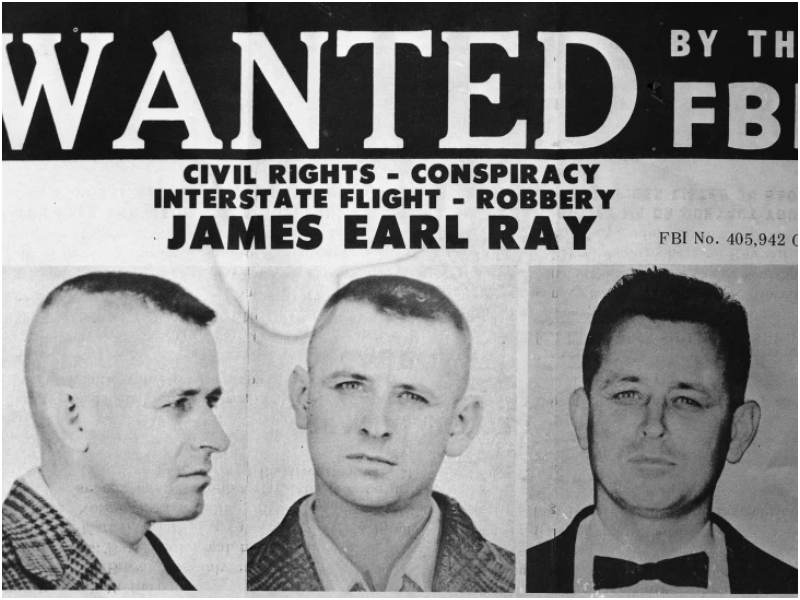On March 10, 1969, a significant chapter in American history unfolded as James Earl Ray pleaded guilty to the assassination of civil rights icon Martin Luther King Jr. in Memphis, Tennessee.
This pivotal moment marked a somber milestone in the ongoing struggle for equality and justice.
Ray’s guilty plea, entered in a Memphis courtroom, shocked the nation and brought to the forefront the gravity of the tragedy that had unfolded just one year earlier.
Martin Luther King Jr., a prominent figure in the civil rights movement and an advocate for nonviolent protest, was tragically gunned down on April 4, 1968, while standing on the balcony of the Lorraine Motel in Memphis.
The assassination sent shockwaves across the country, sparking outrage and prompting widespread calls for justice. The guilty plea from James Earl Ray, a fugitive at the time of his capture, initially seemed to provide a sense of closure to the devastating loss of one of the most influential figures in American history.
However, Ray’s plea would later be met with skepticism and controversy, as he recanted his confession and maintained his innocence until his death.
Despite his guilty plea, Ray claimed that he had been coerced into confessing and asserted that he was merely a pawn in a larger conspiracy.
The legacy of Martin Luther King Jr. endures as a symbol of hope, perseverance, and the ongoing struggle for civil rights.
His profound impact on American society transcends generations, and his message of equality and justice continues to resonate around the world.
As the nation reflects on this historic moment, the memory of Martin Luther King Jr. serves as a reminder of the enduring quest for a more just and equitable society.
The events of March 10, 1969, serve as a solemn reminder of the challenges that lie ahead and the importance of upholding the values of equality, justice, and peace for all.
Also On This Date…
In 1496, Christopher Columbus concluded his second visit to the Western Hemisphere as he left Hispaniola for Spain.
In 1785, Thomas Jefferson was appointed America’s minister to France, succeeding Benjamin Franklin.
In 1864, President Abraham Lincoln assigned Ulysses S. Grant, who had just received his commission as lieutenant-general, to the command of the Armies of the United States.
In 1876, Alexander Graham Bell’s assistant, Thomas Watson, heard Bell say over his experimental telephone: “Mr. Watson — come here — I want to see you” from the next room of Bell’s Boston laboratory.
In 1906, about 1,100 miners in northern France were killed by a coal-dust explosion.
In 1913, former slave, abolitionist and Underground Railroad “conductor” Harriet Tubman died in Auburn, New York; she was in her 90s.
In 1965, Neil Simon’s play “The Odd Couple,” starring Walter Matthau and Art Carney, opened on Broadway.
In 1985, Konstantin U. Chernenko, who was the Soviet Union’s leader for 13 months, died at age 73; he was succeeded by Mikhail Gorbachev.
In 1988, pop singer Andy Gibb died in Oxford, England, at age 30 of heart inflammation.
In 2015, breaking her silence in the face of a growing controversy over her use of a private email address and server, Hillary Rodham Clinton conceded that she should have used government email as secretary of state but insisted she had not violated any federal laws or Obama administration rules.
In 2019, a Boeing 737 Max 8 operated by Ethiopian Airlines crashed shortly after taking off from the capital, Addis Ababa, killing all 157 people on board.
In 2021, the House gave final congressional approval to a landmark $1.9 trillion COVID-19 relief bill against the opposition of Republicans, while the Senate confirmed Merrick Garland to be U.S. attorney general with a strong bipartisan vote.
In 2022, civilians trapped inside the Ukrainian port city of Mariupol desperately scrounged for food and fuel as Russian forces kept up their bombardment amid international condemnation over an airstrike a day earlier that killed three people at a maternity hospital.
In 2023, the Federal Deposit Insurance Corporation seized the assets of Silicon Valley Bank, leaving many Silicon Valley workers and companies potentially locked out of their money in the second-largest bank failure in history, behind only the failure of Washington Mutual in 2008.

